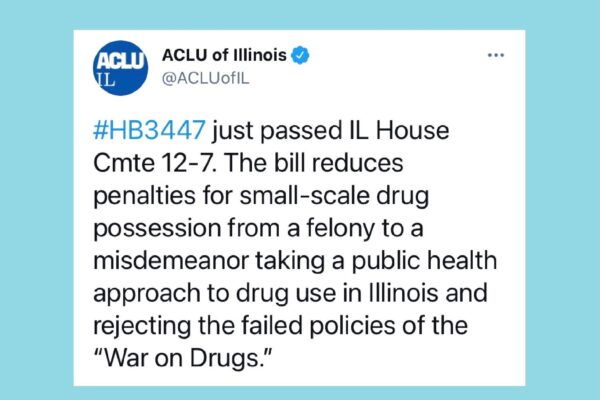A bill that would install a public health approach to drug use in Illinois today cleared a key House Committee in Springfield. Rejecting the failed policies of the “War on Drugs,” House Bill 3447 reduces penalties for small-scale drug possession from a felony to a misdemeanor. Testimony before the Committee demonstrated the compelling need for shifting the State’s approach to drug use. The vote in favor of the bill was 12 to 7.
“Over just three years 20,000 people were convicted of felonies in Illinois for possessing small amounts of drugs and 7,500 were imprisoned,” the bill’s chief sponsor, Rep. Carol Ammons (Urbana) told the committee.
Representative Ammons was joined at the hearing by a diverse panel of witnesses who argued that the measure would address fundamental problems in our criminal legal system and make communities safer by connecting people who need treatment for substance use disorders with community-based services instead of jail. Experts agree that a public health approach is proven to work better to address the harms associated with drug use.
Lake County Sheriff John Idleburg championed the bill, telling committee members, “People dealing with addiction need their safety net of support reinforced, not taken from them through incarceration. Unfortunately, this is exactly what stiff criminal penalties associated with lower-level drug possession offenses do. Our communities deserve investment in recovery services and not steep involvement in the criminal justice system when an addiction crisis affects our community members.”
Committee members also were told that Illinois voters agree with a change of approach in our state. In a poll conducted for the ACLU of Illinois last year, voters made clear that they support changes to punishments handed down for those arrested for possessing illegal drugs. A commanding 79% of voters support making possession of small amounts of drugs a misdemeanor and decreasing sentences for all drug offenses. 84% of voters agree that the state should provide mental health and substance use disorder treatment on demand in Illinois.
The bill now moves to consideration by the full House of Representatives. Advocates for the bill said today that they hope to secure passage in both chambers of the legislature by the May 31st session end.
“New policies around drug sentencing allow us to break the cycle in which punishment and incarceration, rather than treatment and support, are the default responses to substance use disorders,” said Ben Ruddell of the ACLU of Illinois. “This bill builds pathways to community-based treatment for those who need it, and includes expungement and resentencing provisions that will help people with past convictions move on with their lives.”
The polling information released today is drawn from a poll of 600 voters in Illinois conducted by Global Strategy Group from October 27 - November 4. The survey has a margin of error of +/- 4.0% and was conducted online using a voter file match. Care was taken to ensure the poll represented the registered voter universe.

